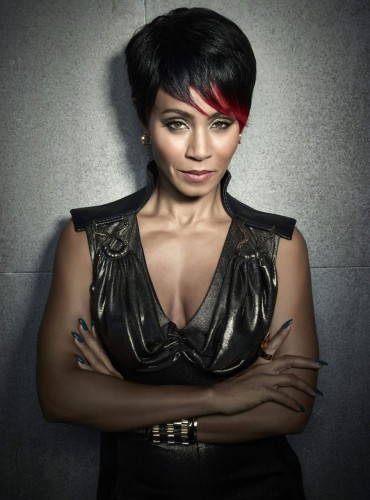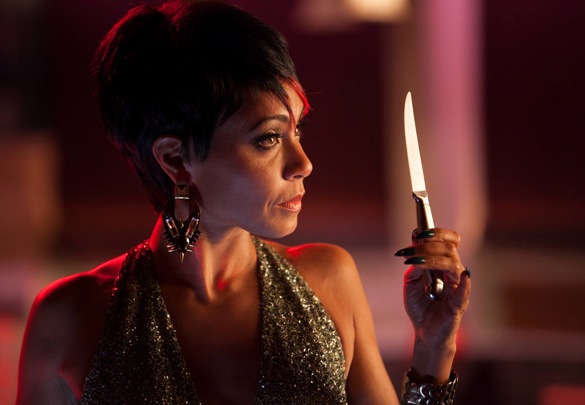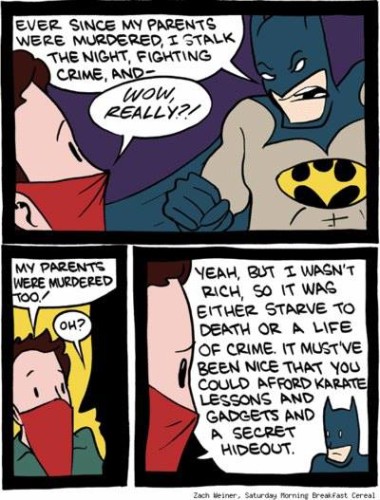[youtube_sc url=”[youtube_sc url=”https://www.youtube.com/watch?v=OJTjKhxFTXo”]
Written by Jackson Adler.
Mob boss and nightclub owner Fish Mooney is an original character in Fox’s Batman and Jim Gordon origin TV series Gotham. Jada Pinkett Smith understands Fish Mooney, and portrays her with intellectual, emotional, and visceral fervor. However, the writers and directors of Gotham don’t seem to understand the character as well, nor how she makes herself fit into the world of Gotham.
In her audition, Pinkett Smith walked in to “show” who Fish Mooney is, not to “talk” about her. She did this by walking into the audition in a short wig, a long gown, and a man on a leash. In an interview with Lance Carter on the Daily Actor, Pinkett Smith elaborates on what “room” she is allowed on set in terms of character input and improvised dialogue, since the writers and directors are still finding Fish’ “voice.” However, it seems that while the writers and directors are still figuring out Fish Mooney, Pinkett Smith has a firm grasp At San Diego Comic Con on the character. She pulls from the background and traumatic childhood of mob boss Griselda Blanco, using that for Fish Mooney’s “triggers” and “violence,” and the “classy” and “fabulous” Norma Desmond from Sunset Boulevard and the actor Joan Crawford for Fish Mooney’s “mask.” This creates what Pinkett Smith rightfully describes as “a scary chick” whom the audience can realistically believe will “go after Gotham” and “just might” succeed in taking it over.
In her interviews, Pinkett Smith uses the words “color” and “shadow” in describing her approach to the character, using a very different vocabulary in describing the character and her “voice” than the show’s creator Bruno Heller. Pinkett Smith states how fun it is for her to delve into “those shadow parts” of herself and not worry about being “politically correct,” like she has to be in her everyday life. What I believe she means to say by talking about “color” and “shadow” and being “politically correct,” is that with Fish Mooney, she can be a powerful Black woman without worrying about coming across as too threatening to a White patriarchal society. Fish Mooney can “hold her own” in the “male dominated Gotham,” and while “these men are no joke,” “Fish can handle” – and sadly, women in such powerful positions are something that we still “don’t see a lot.” She can delve into a fierce side of herself that she normally can’t show in front of the camera. As I’ve written before, as hard as Gotham tries (and fails) to be colorblind, it doesn’t work, because race is a huge part of people’s lives, and to ignore Fish Mooney’s Blackness is to deny much of her lived experiences.

Fish Mooney doesn’t ally herself with White patriarchal characters and organizations under some delusion that doing so will protect her. She rightfully lives on the verge of paranoia, questioning those closest to her to be sure they won’t betray her. She states that head of the “family” mob boss Carmine Falcone has grown “soft” and “old,” even before his true decline because knows that even though she may be Falcone’s “favorite,” it is highly unlikely that he will give the position of head of the “family” to her. The rest of the higher ups in the “family” are White men, and when she asks one of them what they think of the idea of her taking on Falcone’s position, the man responds “sure, why not. Women’s lib and all that,” but that he doubts that Falcone will allow her to take the position, though he does not state why. Fish Mooney decides to take the position by force, but did not count on her underling Oswald Cobblepot/The Penguin to betraying her. She took Cobblepot “under her wing” and treated him “like a son,” but he developed strong resentment toward her. Cobblepot is a skinny and somewhat effeminate character who seems to have romantic feelings for Jim Gordon. (Honestly, when he presented Jim with an invite to his new club, it was like a seven-year-old presenting their crush with a homemade valentine.) A Black woman gave a job to and mentored a queer White boy, giving him an opportunity many of the other mob bosses would most likely have denied. She made him into the resourceful and crafty man he shows himself to be, and he resents her. For what? For verbally reprimanding him when he doesn’t do his job correctly? Perhaps he resents being her umbrella boy and confidant, but if he can’t hold an umbrella steady, why should she promote him? Perhaps Cobblepott has some sexist and racist tendencies, in addition to his apparent mommy issues due to his smothering mother.

Fish Mooney embraces her femininity, as is evident even by her mob boss name. As the only female mob boss we see, her womanhood definitely stands out. She has evidently played on fear and hatred of women to create or adopt her name: “Fish” as in how many refer to the vagina as “smelling fishy,” and “Mooney” as in the menstrual cycle. This way of creating a name, by playing upon fear and hatred, and taking something meant as an insult and reclaiming it for ones own purpose. This is not just a nickname given to her. It is an act of power and defiance. This way of forming an identity is later used by The Penguin, her former protégé, as well as many other characters, including Batman himself. Sadly, character after character, mostly White men, is going to appropriate the actions of a Black woman, of Fish Mooney’s way of finding a new name. The focus of the show is undoubtedly upon the coming of age and the loss of innocence of White men and boys, specifically Jim Gordon, Bruce Wayne, and even Oswald Cobblepot. When Fish Mooney first meets Jim Gordon, a police officer hard on crime, she says “well aren’t you a tall glass of milk,” wary of him from the start. He is the equivalent of a White liberal who wants to “do good” without realizing how intersections of classism, racism, and sexism affect one’s life and career options. He sees her choices as “bad” without taking the time to understand what institutionalized biases lead her to make seemingly “bad” choices in the first place. In Batman lore, “heroes” Jim Gordon Bruce Wayne mostly arrest and lock up people, without noticing what Zach Wein’s comic points out – that crime is not just evil people looking to be evil. Hopefully, like in its somewhat sympathetic depictions Cobblepot and even future Riddler Edward Nygma, Gotham will thoroughly address Fish Mooney’s rough beginnings and her coming of age and loss of innocence, giving her more of the sympathy allotted for the White male leads.
Fish Mooney does all she can for every interaction, every conversation, to be on her terms. She does not want to be used, betrayed, hurt, or killed, and she has no doubt had to fight harder than any of the other characters to be taken seriously. This is a woman who has literally gouged out her own eye and gone down on her own terms rather than be used and hurt by someone else (in this case, another White man). In Gotham, the crime families own the police, the judges, and the politicians, and decide who gets promotions and who ends up dead. These are mostly White men, and yet there is a surprising amount of Black women – perhaps the work of Fish Mooney. While there would no doubt still be violence and criminal activity in a Gotham run by Fish Mooney, all kinds of marginalized groups would be breaking through glass ceilings. A “fisheye” is a kind of camera lens, and the term comes from the way in which a fish sees the world above, looking from the water into the open air. Fish Mooney sees what lies beyond her glass ceiling, and she is going to smash through it or die trying, all played brilliantly by Jada Pinkett Smith. I can only hope that the writers, directors, and producers of Gotham keep giving her more chances to shine.


I know a lot of people watch “Gotham” just for Fish. Hate that she’s leaving after this season.